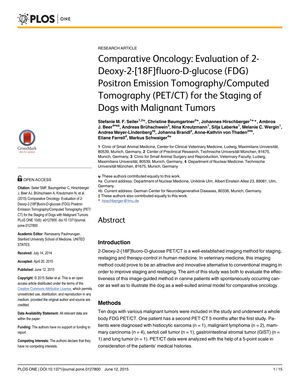Comparative Oncology: Evaluation of 2-Deoxy-2-[18F]Fluoro-D-Glucose (FDG) Positron Emission Tomography/Computed Tomography (PET/CT) for the Staging of Dogs with Malignant Tumors
June 2015
in “
PLOS ONE
”

TLDR FDG PET/CT scans can change cancer treatment plans for dogs.
The document presents findings from a pilot study conducted on 10 dogs with various malignant tumors to assess the effectiveness of FDG PET/CT scans in staging and restaging these cancers. The study revealed that in 7 out of the 10 dogs, the PET/CT scans significantly altered the treatment plans and prognoses. For instance, in dogs with lymphoma, the scans detected increased FDG uptake in multiple lymph nodes, leading to a recommendation for polychemotherapy. In cases of mammary carcinoma and a lung tumor, the detection of multiple metastases resulted in the cancellation of planned surgeries. The study concluded that FDG PET/CT could provide valuable additional information for the staging of canine cancers, potentially improving patient management. However, the study also recognized limitations such as the small sample size and the inability to statistically validate the benefits of PET imaging, while noting that increased FDG uptake could sometimes indicate inflammation rather than malignancy. Further research was suggested to confirm the advantages of PET/CT in veterinary oncology and to consider its application in comparative oncology.
